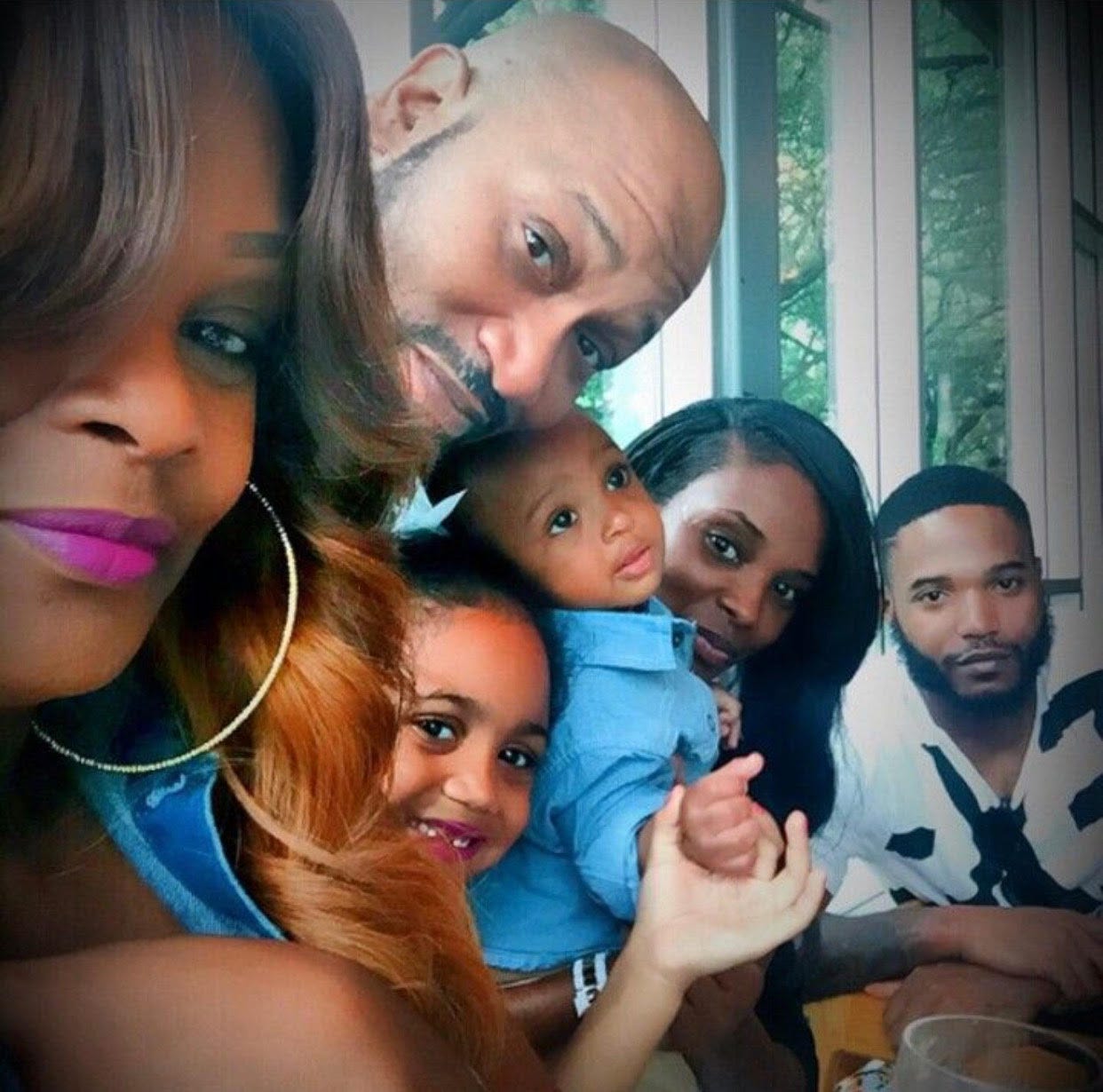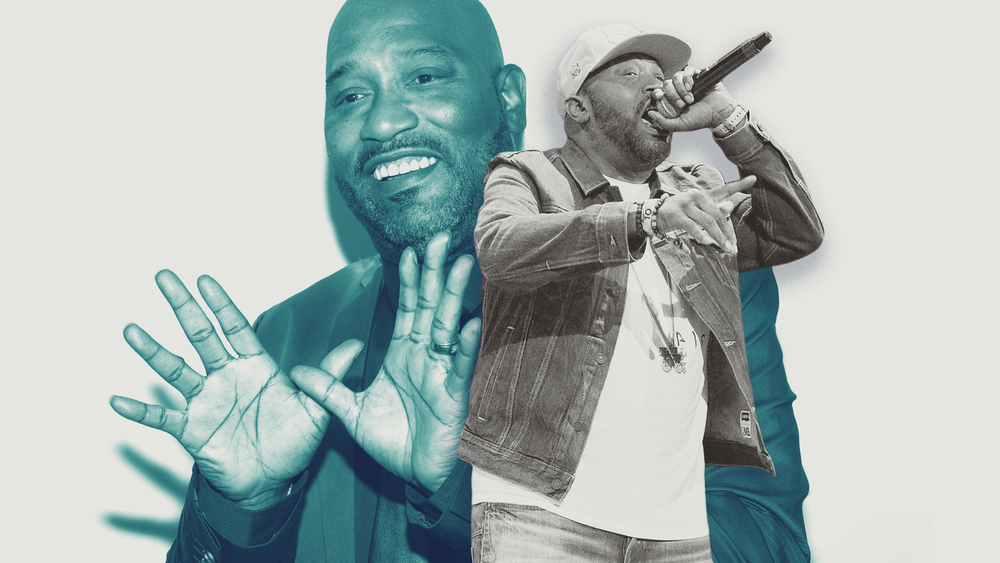“All! Star! Revolution!”
I hear these words at least twice a week. It’s the name of the cheerleading organization that my granddaughter Taylor cheers for, and something my wife and I support to the fullest. She’s been cheering for three years now and loves it to death. So I find myself there almost every Wednesday for practice and at a competition on most Saturdays. This isn’t how I saw myself spending my weekends at 46 — but it’s my new normal.
For the past 27 years, I’ve been a professional recording artist. Rapper, to be exact. But as I’ve gotten older, my life is no longer dominated by recording studios and nightclubs. Even though I still perform 60 to 75 times a year, my downtime doesn’t revolve around all things rap. As a father of two and now grandfather of a five-year-old granddaughter, I find myself in places I never thought I’d be in. And that’s okay.
I started my rap career in 1992. It was a great year in hip-hop: Dr. Dre released The Chronic, Gang Starr’s Daily Operation came out, and Mecca and the Soul Brother by Pete Rock and CL Smooth dropped. Our* debut album Too Hard To Swallow was released that year as well. Hip-hop as a culture was barely old enough to drink, but I still wasn’t. I wasn’t married, had no responsibilities or obligations, and no one cared about my opinions on politics or social conditions in America. All I had to do was be good at my craft — and I was. I could stay up all hours of the night, partying and living it up, embracing my newfound celebrity status. Looking for good weed and good times was my only concern. Hitting up cities like Atlanta and linking up with my guy Big Gipp to get those good trees and sliding through Magic City was the norm. But that only lasted so long. Around the corner was a whole new life.
I met my wife Queenie in the summer of ’96. I’d just gotten the mastered version of my album Ridin’ Dirty and asked my friend Eddie to set up a small get-together at his place. When she walked in I knew she was the one for me. Making her realize I was the one for her, though, wasn’t so easy. She was a single mother with two kids from a previous relationship with a severe case of social anxiety, so being involved with a public figure was not what she was looking for. Over time I was able to convince her otherwise and we’ve been together ever since.
The transition from being a single man doing single-man things to committed husband concerned with family obligations was different, but I gravitated to it.
The lifestyle I had been accustomed to began to change. Afternoons spent smoking weed and sippin’ syrup turned into picking kids up from football and basketball practice. I found myself having to break almost five years of routine behavior overnight. It’s not easy going from only being responsible for yourself to being responsible for others. Some of us bring baggage and brokenness from old relationships into new ones. But I didn’t have kids from a previous relationship, which can complicate things. I was willing to sacrifice to make my relationship, and eventually my marriage, work. We had our own trials and tribulations but we found a way. These things definitely take time.

Eventually, the time I spent being Bun B gave way to being a husband and father. Instead of weekends spent sitting up getting high with the homies, I found myself in high school gymnasiums cheering on my daughter at her basketball games or in the stands at my son’s football games. I would try to be as low-key as possible and let my kids have their respective moments. But it’s very hard for me to not be noticed in Houston. The other kids would be cool about it, but the parents would sometimes make a big fuss.
The transition from being a single man doing single-man things to committed husband concerned with family obligations was different, but I gravitated to it. I’ve never been one to shun responsibility, so taking care of family business wasn’t hard for me. Having a no-nonsense wife tends to help you as well. Together we raised two amazing kids and enjoyed our life together as the “Trillionaires.” And that’s okay.
As you get older in hip-hop, you start to realize how much of it is geared toward the youth. Clubs with signs saying 18 to get in and 21 to drink were welcoming and inviting to me in my younger years. Now it’s more cautionary, letting me know that I enter the building at the potential risk of being the old man in the club. Performance times of 3 a.m. were fun in my twenties, letting me know that an all-nighter was in front of me. Now it just reminds me of how much sleep I’m gonna miss. Pre-gaming turn-ups with liquor and weed gave way to pre-show naps. Finding out what strip club or after-hour spot was jumping after the show has given way to finding out which restaurant with a high Yelp rating would still be open after midnight.
My wife travels with me to every show and she’s a germophobe, so we can’t just stop at Waffle House or stay at the local Hilton anymore. The search for clean food and a clean hotel room is not always easy, so we put a lot of time and effort into it. She will scour the internet for the best local food and newest hotels in cities we travel to. It can be tedious, but we’ve found real gems out there. So a lot of things have changed with time. As they should. The nightlife belongs to the young, not the young at heart. And that’s okay.
I’m glad that I’ve been able to age gracefully in hip-hop. New artists who’ve been influenced by my music find ways to incorporate elements of it into theirs, paying homage and showing respect. Things we used to talk about and phrases we used over 20 years ago are still a part of today’s lexicon. Trill, a word which used to be used strictly within Southern culture, now rolls off the tongues of East Coast artists and finds its way onto Saturday Night Live sketches and popular TV shows. My particular era, which had at least two eras before it, is now considered the “golden age” of hip-hop, and the clothes we wore proudly now only show up on throwback Thursdays or at ’90s-themed parties.
Our culture, for better or for worse, belongs to a new age of artists and consumers. The record store signing, one of the only ways to get the music and meet your favorite artist in person, has given way to Instagram Live conversations, music and merchandise bundles, and streaming sites. But young people don’t see it as less of a connection. They feel even more a part of their favorite artists’ lives. They’re privy to the everyday routines and habits of the people they listen to.
Members of my generation, however, aren’t as internet-savvy as their younger counterparts, and some of them still prefer having a physical product in their hands — which isn’t that easy, as many of their mom-and-pop record stores are long gone. Younger artists can announce a show in the morning and have a line around the corner in an hour’s time, while my fan base needs a couple of weeks to try and get a day off and coordinate babysitters.
It’s not as easy for us as it used to be, but that doesn’t make it any less enjoyable. We gather together and reminisce about the dances we used to do, the clothes we used to wear, and the times we used to have. We aren’t trying to keep up with the new generation. We’re just letting them know that what they’re doing isn’t really new at all. It’s just new to them.
And that’s okay.
*Bun B released that debut album along with Pimp C as legendary Southern duo UGK.
